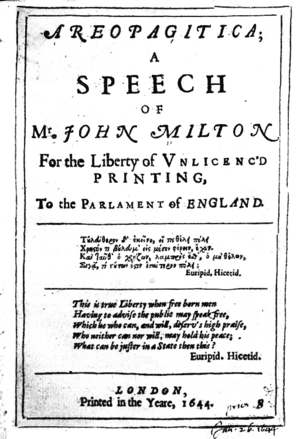Areopagitica facts for kids
Areopagitica is a famous book written by the English poet John Milton in 1644. He wrote it to speak out against censorship. Censorship is when someone in power stops books, articles, or other media from being published or shared.
The full name of Milton's book is Areopagitica: A speech of Mr. John Milton for the liberty of unlicensed printing to the Parliament of England. Today, this kind of book is often called a tract. In Areopagitica, Milton strongly argued for the freedom of expression. This means people should be allowed to share their ideas without being stopped. Many people today see it as one of the most important writings ever about the freedom of the press. This is the idea that newspapers and books should be able to publish freely.
Contents
What Is Areopagitica About?
Milton's book is named after a speech by Isocrates. Isocrates was a famous Greek orator from a long time ago (the 5th century BC). The Areopagus is a hill in Athens, Greece. Important councils and tribunals (like courts) used to meet there. Isocrates wanted to bring back one of these old tribunals.
In his speech, Milton argued that a law called the Licensing Order of 1643 should be removed. This law made it so that books had to be approved before they could be printed. Milton said that censorship like this was not common in ancient Greek or Roman societies.
Why Did John Milton Write It?
Milton used many parts of the Bible to make his argument stronger. He also had a personal reason for writing Areopagitica. Milton himself had faced censorship. He had tried to publish books that talked about new ideas for marriage and divorce. These books were stopped from being printed. This experience made him even more determined to fight for the right to publish freely.
Milton's Big Idea About Publishing
In Areopagitica, Milton suggested that the old way of publishing worked best. Before the new law, books only needed to have the author's name or the publisher's name on them. Milton believed it was easy to find out who wrote or published a book this way.
He argued that if something harmful or libelous (meaning it spreads false and damaging information) was published, the books could still be destroyed *after* they were printed. This way, ideas could be shared first, and only then would bad ones be dealt with. Milton believed that people should be trusted to read different ideas and decide for themselves what is true.
Images for kids
-
The Areopagus, viewed from the Acropolis
See also
 In Spanish: Areopagítica para niños
In Spanish: Areopagítica para niños
 | Delilah Pierce |
 | Gordon Parks |
 | Augusta Savage |
 | Charles Ethan Porter |



